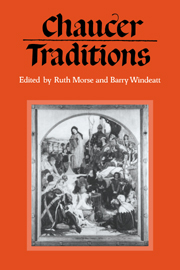Book contents
- Frontmatter
- Contents
- List of contributors
- Preface
- Note on the text
- 1 Chaucer traditions
- 2 Gower–Chaucer's heir?
- 3 Chaucer and Lydgate
- 4 Hoccleve and Chaucer
- 5 Chaucer and fifteenth-century romance: Partonope of Blois
- 6 Some Chaucerian themes in Scottish writers
- 7 The planetary gods in Chaucer and Henryson
- 8 Gavin Douglas: ‘Off Eloquence the flowand balmy strand’
- 9 Skelton's Garlande of Laurell and the Chaucerian tradition
- 10 Chaucerian metre and early Tudor songs
- 11 Aspects of the Chaucerian apocrypha: animadversions on William Thynne's edition of the Plowman's Tale
- 12 The shape-shiftings of the Wife of Bath, 1395–1670
- 13 The genius to improve an invention: transformations of the Knight's Tale
- 14 From the Clerk's Tale to The Winter's Tale
- 15 The Virtuoso's Troilus
- 16 Rewriting romance: Chaucer's and Dryden's Wife of Bath's Tale
- 17 Chaucer's religion and the Chaucer religion
- 18 A list of the published writings of Derek Brewer
- Index
7 - The planetary gods in Chaucer and Henryson
Published online by Cambridge University Press: 23 September 2009
- Frontmatter
- Contents
- List of contributors
- Preface
- Note on the text
- 1 Chaucer traditions
- 2 Gower–Chaucer's heir?
- 3 Chaucer and Lydgate
- 4 Hoccleve and Chaucer
- 5 Chaucer and fifteenth-century romance: Partonope of Blois
- 6 Some Chaucerian themes in Scottish writers
- 7 The planetary gods in Chaucer and Henryson
- 8 Gavin Douglas: ‘Off Eloquence the flowand balmy strand’
- 9 Skelton's Garlande of Laurell and the Chaucerian tradition
- 10 Chaucerian metre and early Tudor songs
- 11 Aspects of the Chaucerian apocrypha: animadversions on William Thynne's edition of the Plowman's Tale
- 12 The shape-shiftings of the Wife of Bath, 1395–1670
- 13 The genius to improve an invention: transformations of the Knight's Tale
- 14 From the Clerk's Tale to The Winter's Tale
- 15 The Virtuoso's Troilus
- 16 Rewriting romance: Chaucer's and Dryden's Wife of Bath's Tale
- 17 Chaucer's religion and the Chaucer religion
- 18 A list of the published writings of Derek Brewer
- Index
Summary
Cresseid's vision of the planetary gods occupies a position of central importance in The Testament of Cresseid. It is by far the longest of the static rhetorical set-pieces which punctuate the poem, and it constitutes the pivotal moment in Cresseid's passage from prosperity to misery. The visual power of the linked series of portraits lodges it securely within the sequence of mental images – the aged poet huddled by the fire in his ‘oratur’, the deformed Cresseid, the jewels showered into her lap – into which the poem resolves itself in the memory. In giving the planetary gods a role in the narrative dynamics of his poem, Henryson is following in the steps of ‘worthie Chaucer glorious’ – the Chaucer of the Knight's Tale and the Complaint of Mars as well as of Troilus and Criseyde. In what follows, I propose to examine both the resemblances and the differences between the two poets in their use of this cosmological dimension to the narrative action; they will not only reveal the intelligence and creativity of Henryson's response to Chaucer, but will also lead into an understanding of the structural principle underlying the Testament and of Henryson's conception of his own relation to its subject.
Chaucer's introduction of the planetary gods into his poetic narratives has as its single most important effect the creation of an enlarged perspective on the course of events.
- Type
- Chapter
- Information
- Chaucer TraditionsStudies in Honour of Derek Brewer, pp. 91 - 106Publisher: Cambridge University PressPrint publication year: 1990
- 3
- Cited by

